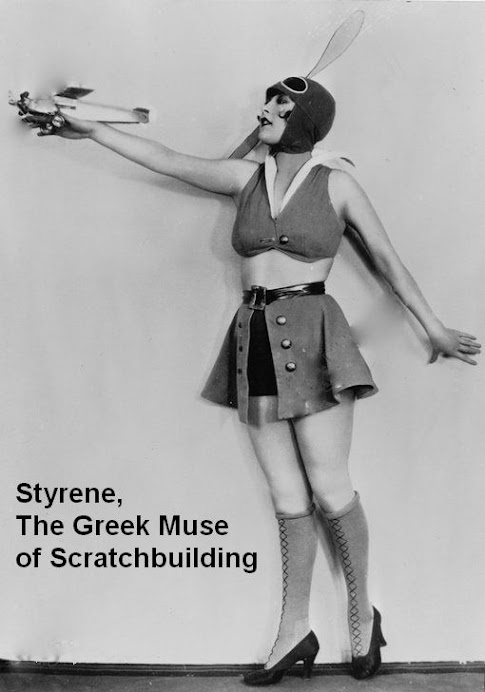(Image from the SDASM photostream)
The completed models is here:
https://wingsofintent.blogspot.com/2023/12/tom-maysons-1947-mustang-racer.html
This model is being built in parallel with two other Mustangs:
https://wingsofintent.blogspot.com/2023/11/mustang-n13y-anson-johnson-racer-1949.html
https://wingsofintent.blogspot.com/2023/12/a-36-apache-p-51a-mustang-racer.html
Many racing and civil conversions have been presented in this blog. More recently, an involving one on a Mustang, then one that just need a few changes/additions (Corsair), and now one that is among the easiest. No major surgery required, only the deletion of military-related features. For this model the Academy kit was used -easy and quick to build- which is fair enough. The fit is not bad, but is not excellent; still, much better than scores of other kits I have built. But there are other newer kits out there that pack more detail and in general have a higher level of accuracy. Nonetheless, having the kit in the stash already, and confident that it would render a credible model, here it is Tom Mayson’s Bendix 1947 racer, which placed 6th. The Draw Decals sheet is used, with these personal notes:
a) I believe the antiglare panel on top of the nose stops sort of the spinner, in a pointy angle -this is seen in a very large number of Mustang photos- and not as described in the instructions “touching” it with a blunt end.
b) Looking at photos, my assumption is that the elevators were also painted red, like the rudder. This I think is barely visible in one color photo that shows and edge with a smidgen or red, and can also be deduced from some B&W ones. This would make sense as it matches the scheme of the painted wings and rudder.
The only minor surgery -in this particular Academy kit case- is adding the angled fin fillet. Other kits already come with that option, and even the Academy P-51C comes with it, it’s just I had the kit on the stash, as explained.
The only addition is an RDF under the belly air intake, easily sourced from the spares bin or home-made.
For those so inclined, there are some aftermarket sets for this kit. I bought a couple, but desisted, thinking that most of the improvement is hardly visible or noticeable, plus the P.E. sets have obscure instructions for some of the subassemblies. Poor/confusing/small instructions I find are one of the banes of the hobby. What I did use is the Eduard “kabuki” paper mask set. Another little mod was to add a blanking piece to avoid the see-through effect of the old Academy kit as a piece of styrene with a metal mess painted black.
As mentioned, for this conversion you can use more updated kits, but I love to see an old dog perform new tricks. I have built the Arma, Airfix and Academy Mustangs, more than once, and the Arma kit is of course the more detailed, but for the same token requiring a much longer building time, a sharp eye and a steady hand. Still, I enjoy working on the old birds from time to time; with a bit of TLC they turn out just fine.
A good wash:
Exaggerated sketch of the wing moldings. For a better fit, the trailing edge angle needs sanding from inside:
Areas to be carefully and evenly scraped and sanded:
Some airbrushing:
Then kit has a bit of a see-through effect, so a radiator is fabricated to be placed inside the belly conduit:
After some detailing of the interior, the fuselage is assembled. More surface detail is deleted:
Now on (hopefully) the last miles before a successful landing:
Preparing the line-up:
First coat of primer:
A coat of gloss white as a base for the red and yellow:
Modelers know that is better to paint darker colors on lighter ones, but sometimes the masking is easier doing the opposite, although surely not preferable. In this case I wanted to know if I could paint the red on the yellow (the model at that stage was all gloss white as a base), and started to "practice" the masking of the future yellow. I got carried away but realized that it could be done...once I have masked the white completely. So I applied the red, and now have to mask it to apply the yellow. As the late Jim Schubert used to say "modelers are their worst own enemies".
After airbrushing the yellow and the anti-glare black, the landing gear goes in, as well as the antenna on the belly and the exhausts:
The Draw Decal set is applied:
The completed models is here:
https://wingsofintent.blogspot.com/2023/12/tom-maysons-1947-mustang-racer.html

.jpg)
.jpg)
.jpg)
.jpg)
.jpg)
.jpg)
.jpg)
.jpg)
.jpg)
.jpg)
.jpg)
.jpg)
.jpg)
.jpg)
.jpg)
.jpg)
.jpg)
.jpg)
.jpg)
.jpg)
No comments:
Post a Comment